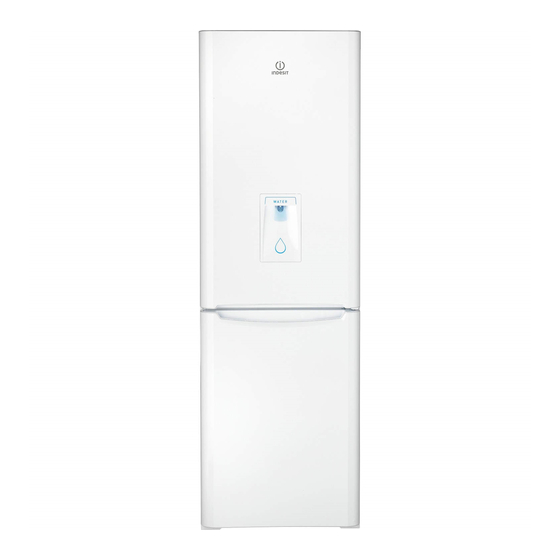Indesit BIAAA 12P UK Instrukcja obsługi - Strona 7
Przeglądaj online lub pobierz pdf Instrukcja obsługi dla Lodówka Indesit BIAAA 12P UK. Indesit BIAAA 12P UK 12 stron. Refrigerator/freezer combination

Start-up and use
Starting the appliance
! Before starting the appliance, follow the installation
instructions (see Installation).
! Before connecting the appliance, clean the compartments and
accessories well with lukewarm water and bicarbonate.
1. Insert the plug into the socket and ensure that the internal light
illuminates.
2. Turn the TEMPERATURE ADJUSTMENT knob to an average
value. After a few hours you will be able to put food in the
refrigerator.
Setting the temperature
The temperature inside the refrigerator compartment automatically
adjusts itself according to the position of the thermostat knob.
= warmest
= coldest
We recommend, however, a medium position.
The cooling section of the refrigerator is located inside the back
wall of the refrigerator compartment for increased space and
improved aesthetics. During operation, the back wall will be
covered in frost or water droplets depending on whether the
compressor is operating or paused. Do not worry, the refrigerator
is functioning normally.
Chiller system
The appliance comes with one of the chiller systems described
below: take note of your system in order to determine the most
efficient food storage method.
PURE WIND *
It is recognizable due to the presence of the mechanism on the
top part of the refrigerator compartment (see diagram).
B
A
Pure Wind maximises air circulation, improving the efficiency of
the evaporator and helping to achieve the optimal temperature
inside the refrigerator as quickly as possible each time it has
been opened. The blown air (A) is cooled when it comes into
contact with the cold wall, whereas the hotter air (B) is sucked
up (see diagram).
Static
Models without the Aircooler have the cooling section in the
internal back wall of the compartments. The wall will be covered
in frost or water droplets depending on whether the compressor is
operating or paused: both cases are normal. If the TEMPERATURE
ADJUSTMENT knob has been set on high values with large
quantities of food and with a high ambient temperature, the
appliance can operate continuously, resulting in excessive frost
formation and excessive energy consumption: compensate for
this by shifting the knob towards lower values (defrosting will occur
automatically).
PLEASE PHONE US TO REGISTER YOUR APPLIANCE AND ACTIVATE YOUR 5 YEAR PARTS GUARANTEE ON 08448 24 24 24
B
B
A
In static appliances, the air circulates in a natural way: the colder
air tends to move downwards as it is heavier. The food should be
stored as follows:
Arrangement inside the
Food
refrigerator
Fresh fish and meat
Above the fruit and vegetable bins
Fresh cheese
Above the fruit and vegetable bins
Cooked food
On any shelf
Salami, loaves of bread,
On any shelf
chocolate
In the fruit and vegetable
Fruit and vegetables
compartment bins
Eggs
On the shelf provided
Butter and margarine
On the shelf provided
Bottles, drinks, milk
On the shelves provided
Using the refrigerator to its full potential
• Use the TEMPERATURE ADJUSTMENT knob to adjust the
temperature (see Description).
• Place only cold or lukewarm foods in the compartment, not hot
foods (see Precautions and tips).
• Remember that cooked foods do not last longer than raw foods.
• Do not store liquids in open containers. They will increase
humidity in the refrigerator and cause condensation to form.
Food hygiene
1. Once you have bought your food, remove all external
packaging made of paper/cardboard or other wrappers, which
could introduce bacteria or dirt inside your refrigerator.
2. Protect the food, (especially easily perishable items and those
that have a strong smell), in order to avoid contact between
them, thereby removing both the possibility of germ/bacteria
contamination as well as the diffusion of strong odours inside
the fridge.
3. Store all food in such a way as to ensure air can circulate freely
between different items.
4. Keep the inside of your fridge clean, taking care not to use
oxidiser or abrasive products.
5. Remove all food past its expiry date from the refrigerator.
6. For the correct preservation of food, all easily perishable items
(soft cheeses, raw fish, meat, etc.) should be stored in the
coldest zone of the fridge compartment, i.e. just above the
salad crisper where the temperature indicator is situated.
Using the freezer to its full potential
• Do not re-freeze food that is defrosting or that has already been
defrosted. These foods must be cooked and eaten (within 24
hours).
• Fresh food that needs to be frozen must not come into contact
with food that has already been defrosted. Fresh food must
be stored in the top FREEZER and STORAGE compartment
where the temperature drops below -18°C and guarantees
rapid freezing.
• Do not place glass bottles which contain liquids, and which
are corked or hermetically sealed in the freezer because they
could break.
• The maximum quantity of food that may be frozen daily is
indicated on the plate containing the technical properties
located on the bottom left side of the refrigerator compartment
(for example: Kg/24h: 4)
• In order to obtain a greater amount of space in the freezer
compartment, you may remove the bins (except the lowest
bin and the special COOL CARE ZONE bin, which has an
adjustable temperature) and place the food directly onto the
evaporator plates.
GB
7
